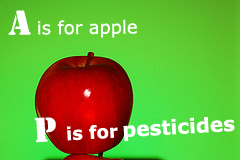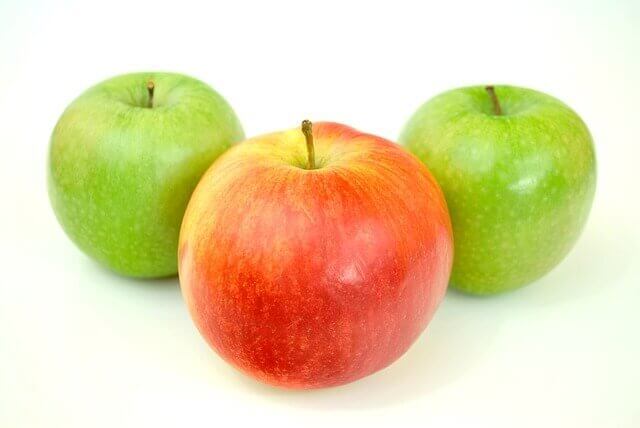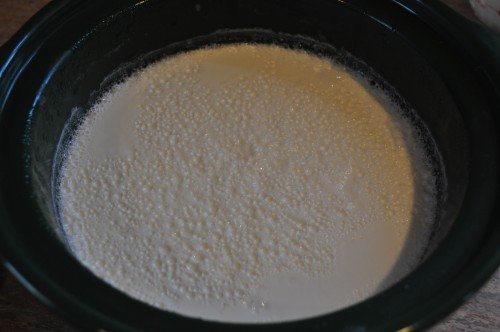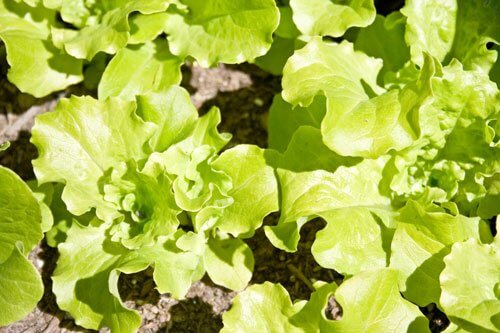The Dirty Dozen- Making the most of the money you spend on organics

Have you ever wondered whether some fruits or vegetables are more important to buy organic than others? The simple answer is yes!
Certain crops can be more difficult to grow, and when not using organic and natural methods, require the use of many more pesticides and sprays than other crops. So while it would be ideal to be able to purchase all of our produce organic, I know that the reality of the budget does not allow me to do so, and I’m guessing the same goes for most of you!
Allow me to introduce you to the Dirty Dozen… these are the most pesticide laden, over sprayed crops of them all. Actually, the list that I found for you lists far more than a dozen, ranging from the very worst, to the best (those that are the most minimally sprayed, despite being conventional and not organically grown).
Quickly, go take a look at them, and then come back (you’ll need to scroll down a little to see them)…
Now let me explain how this list will serve both your family (by reducing toxins in their food) and your wallet (by reducing cost on unnecessary expenses). Suppose you are going to the store for red peppers, tomatoes, broccoli, onions, carrots, and strawberries. You have enough money to buy some of them organic, but not all.
So let’s take a look at the list. Hmmm, peppers and strawberries are up in the top 6. Definitely buy organic. And carrots are right up there, too, at #13. Considering carrots can be quite reasonably priced (at least where I live), I’d definitely get those organic as well. Now the money is getting a little tight (those peppers and strawberries can be expensive!). But look, tomatoes are only #29 and broccoli is even better at #35. Maybe those could just be conventional, and washed really well. And look at that- onions are on the very bottom of the list! So pick up that $0.99 bag of regular onions, instead of the organic ones for $2.49 and feel relaxed about that choice. That wasn’t so bad, was it?
When continually faced with choices between quality and cost, it can help so much to have a guide to which items really matter, and which items are just not such a big deal. Ideally, I would love to buy 100% organic food, and support sustainable farming, the reduction of pesticides being put into our water and soil and the wonderful men and women who are bringing these naturally produced products back to our markets.
For now, though, it seems that the most frugal option is to carefully pick and choose which organic items are the best value, and which ones I can do without. Once again, I truly believe that we do not have to choose between healthier, more natural living and careful stewardship of our finances (which is what frugality is all about).
(Update: Since I first posted this, EWG has revised and updated their Shopper’s Guide to Pesticides. Some of the ratings may be different than they were when I composed this post. The Shopper’s Guide can now even be downloaded as an application on your iPhone or iPod Touch, or just printed out and kept in your wallet or purse.)
Do you use the Dirty Dozen as a guide for choosing which produce to purchase organic? Do you find that it helps you to prioritize how you use your food dollars?






When budget etc. allows, I try to buy ALL my produce organically. But it doesn’t always allow, so I often refer to lists like the one you linked to above to prioritize. Organic dairy is my first priority, I will not purchase regular. Then there are certain fruits and vegetables I will only buy organically, and meat must be free-range/natural (but I wait for sales and stock up) if not organic. Everything else is a matter of money versus the list. 🙂
Thanks for posting this, it’s nice to know someone else feels that health should not be sacrificed in the name of the almighty dollar. 🙂 I appreciate your wisdom here and all the information too!
Thanks for the link with the pesticide rankings! I haven’t seen anything more than the top and bottom 12. I actually have the list of the top 12 in my wallet so I don’t have to try and remember when I hit the grocery stores!
I have a general rule of thumb for buying organic. Anything I can peel, I buy regular but if the outer layer cannot be peeled I buy organic. Also for carrots, I have read if you cut and inch off the top before using, you will reduce pesticides as that is there they gather mainly! Thanks for sharing!
I’m a newcomer to your blog, and have really been enjoying it! About a year ago, after the birth of my 2nd child, I made a radical decision to go completely natural/organic, and eliminate as many chemicals as possible from our lives. However, pretty soon the financial reality of that caught up with us, and I realized we were going into debt in order to finance our organic lifestyle. I had to let a lot of things go, and be much more choosy about what I bought organic, and what would have to be non-organic. We live in a fairly remote part of Canada, where organic produce will cost your first-born, and when I do buy it, it has traveled so far to get here that it is half-rotten by the time I bring it home. So I’ve been choosing instead to buy fresh, local produce (from a local farmer) when it’s in season, and regular, grocery store produce when it’s not. The only organics I’ve been buying lately are of the packaged or frozen variety – things like grains, cereal, peanut butter, that sort of thing. In order to afford that, I’ve eliminated almost all processed food, and try to make as many things from scratch as possible. I’ve also had to give up organic dairy, which was one of the hardest things to give up – however, I recently read somewhere that the growth hormones given to cows to make them produce more milk are illegal here in Canada, so that gives me some relief.
Just wanted to say thanks for such a great post, you’ve inspired me to re-examine my grocery list and give more thought to prioritizing my organic purchases.
This is a terrific post and a fabulous blog!! I posted on the same topic but not in nearly as much detail. I’m linking back to your post from mine and I can’t wait to read your back links to cosmetics and cleaners!! You are a kindred spirit!!
I agree with Mrs. Taft about dairy. I feel the same way about meat too. I’ve read that the higher up the food chain, the more important it is. Now, the milk and meat I buy aren’t certified organic (very expensive for local farmers to become certified) but they are local, pastured and treated humanely. While not “certified”, they also don’t use pesticides or feed the animals a diet they are not supposed to be eating (ex: cows are ruminants and have no business eating grains…pastured beef has MUCH lower saturated fat and a rare Omega 3 fatty acid that is SO good for you). Organic is a wonderful term to help you determine how a food is produced, but if you know the farmer and his methods of production, it can be unnecessary.
I urge people to check out local sources of meat and dairy…you can often buy a half a cow or other animal at reasonable prices.
I have a pastured cow coming next week and it will average out to about $3.00#…and that includes the tenderloins, T-bone, roasts, etc.
Very helpful!
Thanks, this is really helpful. Isn’t it nice that broccoli and blueberries are near the bottom since, according to my limited knowledge, they are two of the best things we can be eating.
Mrs. Taft, I agree about dairy and meat being top priority!
Donielle, good for you to keep it in your wallet! I need to do that.
Stephanie, I’ve heard the same thing about carrots being better once you cut the top off. As far as peeling, with many foods (especially apples, pears, peaches, etc.) even peeling is not enough because the sprays can really be absorbed into the fruit, unfortunately. 🙁
Thanks Alissa, and good for you, choosing to go as natural as possible! Sounds like you’re making some great decisions.
Aww, a kindred spirit? I’m brought back to my childhood love of Anne. 🙂 I’ll have to visit you, Lady Why!
Erica, yes, I agree- you can find great sources of meat and poultry that are not certified organic! The stuff that I buy is actually not certified, but comes from a small, local deli and is much more naturally raised. The prices stay much more affordable without the certification fees for the farmers.
fullheart, glad it was helpful. And I was so surprised and happy to see some of what was near the bottom, too! I hadn’t seen such a thorough list before, but I love it. And we’re blueberries lovers, too!
This is a really helpful post and list, thank you for posting! I try to buy organic and/or locally but will definitely keep these in mind when shopping, especially for fruit for my little guy as it becomes more in season!
Have a great week!